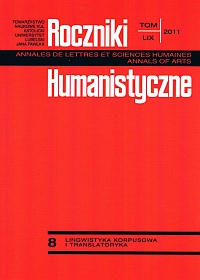Rola języka naturalnego w metafizyce realistycznej
Abstrakt
The problem of language, its function and structure have become the object of study not only for the grammarians but also for the philosophers. Some philosophical analysis, which concern the language, may be continued in different directions. It is visible in the creation of linguistic philosophy nowadays and in different linguistic theories (proposed by F. de Saussure, N. Chomsky, E. Benveniste and others). The reflection of this article on the language used in the realistic metaphysics focuses on the question concerning the essence of the language, its reason and the final aim of its existence. This question on the metaphysical problematics distinguishes the metaphysical research concerning the natural language of language philosophy from the modern linguistic theories.
Le rôle de la langue naturelle dans la métaphysique réaliste
Le problème de la langue, sa fonction et sa structure sont devenus l’objet d’étude non seulement des grammairiens mais aussi des philosophes. Les analyses philosophiques qui concernent la langue peuvent être continuées dans des directions différentes, ce qui est visible dans la création de la philosophie linguistique dans les temps modernes et de différentes théories linguistiques (F. de Saussure, N. Chomsky, E. Benveniste, et d’autres). La réflexion de cet article sur la langue employée dans la métaphysique réaliste, se concentre sur la question concernant l’essence de la langue, la raison et le but final de son existence. Cette question sur la problématique métaphysique distingue la recherche métaphysique sur la langue naturelle des philosophies de la langue et des théories linguistiques modernes.
Bibliografia
Gellner É., 1984, Słowa i rzeczy czyli nie pozbawiona analizy krytyka filozofii lingwistycznej, tłum. T. Hołówka, Warszawa.
Lyons J., 1975, Wstęp do językoznawstwa, tłum. K. Bogacki, Warszawa.
Gilson É., 1975, Lingwistyka a filozofia, przeł. i przypisami opatrzyła H. Rosnerowa, Warszawa.
Kovács F., 1977, Struktury i prawa językowe, tłum. M. Sysak-Borońska, Wrocław–Warszawa–Kraków–Gdańsk.
Lingwistyka a filozofia. Współczesny spór o filozoficzne założenia teorii języka, Teksty wybrała, opracowała oraz wprowadzeniem poprzedziła B. Stanosz, 1977, Warszawa.
Krąpiec M. A., 1979, «Język i jego kreatywne aspekty», [in:] Roczniki Filozoficzne, 27, z. 1, 21-43.
Krąpiec M. A., 1981, «Język naturalny podmiotowo-orzeczeniowy (analiza sądów)» [in:] Tomasz Akwinu, De ente et essentia. O bycie i istocie, przekład-komentarz-studia, Mieczysław A. Krąpiec, Lublin, 140-162.
Arystoteles, 1990, Kategorie, tłum. K. Leśniak, Warszawa.
Kaczmarkowski M., 1990, «Językoznawstwo w Kratylosie Platona. Wprowadzenie» [in:] Platon, Kratylos, tłum. Z. Brzostowska, Lublin.
Maryniarczyk A., 1991, «Uwarunkowania logicznej charakterystyki języka metafizyki» [in:] Studia Phil. Christ., nr 2, 109-17.
Krąpiec M. A., 1995, Język i świat realny, Dzieła, t. 13, wyd. 2 (popr.), Lublin, RW KUL.
Krąpiec M. A., 1995, Znaki i rzeczywistość, "Człowiek w Kulturze" nr 4-5, 5-44.
Arystoteles, 1996, Metafizyka, tekst pol. oprac. M. A. Krąpiec, A. Maryniarczyk na podstawie tłum. T. Żeleźnika, t.1-2, Lublin, ks. IV i V.
Gilson É., 2006, Byt i istota, tłum. D. Eska i J. Nowak, Warszawa, 250-284.
Copyright (c) 2011 Roczniki Humanistyczne

Utwór dostępny jest na licencji Creative Commons Uznanie autorstwa – Użycie niekomercyjne – Bez utworów zależnych 4.0 Międzynarodowe.





